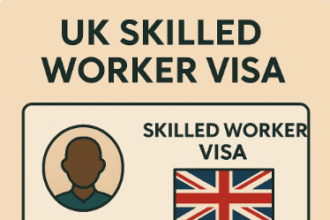Introduction to Certificate of Sponsorship (COS)
A Certificate of Sponsorship (COS) is a crucial document in the UK immigration framework, particularly for foreign nationals seeking employment under the Skilled Worker visa. Essentially, it serves as evidence of a job offer from a UK employer, allowing the prospective employee to apply for a visa and work legally in the country. The COS embodies a promise from the employer to sponsor the employee, validating that the job meets the standards set by the UK Home Office regarding salary and skill level.
The significance of the COS cannot be overstated; it is a fundamental requirement for anyone navigating the UK immigration system as a skilled worker. Without a valid COS, an individual will not be able to move forward with the visa application process. Employers who wish to hire skilled workers from overseas must be registered with the Home Office and hold a valid sponsorship license. It is their responsibility to issue a COS, which includes details about the job, the employee’s personal information, and confirms the employer’s adherence to immigration regulations.
The document is not only essential for securing a visa but also plays a vital role in establishing the legitimacy of the employment offer. It assures the UK government that the job being filled cannot be adequately filled by a resident worker, thereby demonstrating compliance with labor market tests. For skilled workers, understanding the COS process is paramount, as it directly impacts their ability to successfully integrate into the UK workforce.
In summary, a COS is indispensable for skilled workers aspiring to work in the UK, signifying a valid job offer and serving as a gateway to obtaining a Skilled Worker visa. Understanding how the COS functions is critical for both employers and employees in ensuring a smooth immigration process.
Eligibility Criteria for a Free COS
To obtain a Certificate of Sponsorship (COS) in the United Kingdom as a skilled worker, certain eligibility criteria must be met. These requirements not only pertain to the applicant but also involve the UK employers who seek to sponsor them. Generally, the free COS is intended for roles that are on the Shortage Occupation List, which identifies areas within the UK workforce that are experiencing significant shortages. Positions in sectors such as healthcare, engineering, and information technology are commonly included in this list. It is essential that the job offer aligns with these designated occupations to qualify for the free COS.
Furthermore, the role must meet the minimum salary threshold set by the UK Home Office, which is currently £26,200 annually or the “going rate” for the occupation, whichever is higher. In some scenarios, there are exceptions that may allow for reduced salary thresholds, particularly for new entrants to the labour market or positions that qualify for the Health and Care visa. An applicant must hold a job offer from a Home Office licensed sponsor; the employer plays a crucial role in this process, as they are required to submit the application for the COS on behalf of the candidate.
Additionally, applicants must demonstrate that they possess the necessary skills and experience to perform the job in question. Typically, this includes having at least a level 3 qualification, which equates to A-levels or equivalent. English language proficiency is another critical criterion, as applicants must prove their capability through recognized intake procedures. Meeting these consolidated requirements effectively paves the way for a skilled worker to receive a free COS, allowing them to work legally in the UK.
Finding a Sponsor: The Role of Employers
Securing a Certificate of Sponsorship (COS) is a pivotal step in the journey of obtaining a Skilled Worker visa in the UK. Central to this process is the identification of a suitable employer who is willing to sponsor your application. Employers play a crucial role in the COS application, as only those with a valid sponsorship license can issue a COS to prospective employees. This ensures that candidates meet the necessary criteria for skilled positions, which are integral to the UK labor market.
To identify potential sponsors, it is essential to research employers within your field of expertise. The UK government provides a list of licensed sponsors which can be accessed online, detailing organizations across various sectors that are authorized to issue COSs. Targeting industries actively seeking skilled workers, such as healthcare, technology, engineering, and construction, can enhance your chances of receiving a sponsorship offer. These sectors not only require specialized skills but also often have initiatives aimed at attracting foreign talent to fill skills shortages.
When evaluating potential employers, consider the following key factors to ensure they can provide you with a free COS. Firstly, confirm that the employer holds a valid sponsorship license, which is a prerequisite for issuing a COS. Secondly, assess the employer’s commitment to employee development and support, as this may reflect their willingness to invest in your career. Additionally, research the employer’s reputation in the industry and any initiatives they may have in place to foster diverse and inclusive hiring practices. This can indicate a supportive work environment that values skilled professionals and may further ensure a smoother transition in your work-life in the UK.
The Application Process for a COS
Obtaining a Certificate of Sponsorship (COS) is a crucial step for skilled workers aiming to work in the UK. The COS application process primarily involves the employer, who must apply on behalf of the prospective employee. The first step begins with the employer obtaining a sponsor licence from the UK Home Office. This licence allows them to sponsor skilled workers and is essential for the application of a COS.
Once the employer has secured their sponsor licence, they must determine the appropriate job role for the prospective skilled worker. It’s important to ensure that the job meets the eligibility criteria set forth by the Home Office, including appropriate skill levels and salary thresholds. The employer will then create a COS request through the sponsorship management system (SMS), which involves filling out specific details about the job role, the employee, and the validity period of the COS.
Along with the application, employers typically need to provide several key documents, such as proof of the job offer, evidence of the employee’s qualifications, and information about the company itself. The accuracy and completeness of these documents are paramount, as any discrepancies could lead to delays or rejection of the application.
The processing time for a COS application can vary, but employers should generally allow several weeks for the decision. It is advisable for employers to apply for the COS well in advance of the skilled worker’s intended start date to avoid any potential inconveniences.
Common pitfalls in the COS application process include failing to provide the required documentation, inaccuracies in the job details, and not adhering to the maintenance of records. Employers must remain diligent throughout the application process to ensure a smooth experience for the skilled worker they intend to hire.
Cost and Duration of a COS
When considering the cost and duration of a Certificate of Sponsorship (COS) in the context of Skilled Workers in the UK, it is vital to understand that these factors vary based on specific circumstances. Generally, employers are responsible for the COS fees, which can present a financial barrier for some. The standard fee for a COS, as set by the UK Home Office, is often subject to periodic changes, so it is advisable for employers to check the latest guidelines before proceeding with the application.
However, there are provisions under which obtaining a COS can be free. For instance, certain small businesses that meet specific criteria, such as having a limited number of employees or funding, may qualify for exemptions from COS fees. Additionally, organizations sponsoring individuals under various government initiatives may not have to incur these costs. This waiver can be a significant consideration for both employers and prospective skilled workers, making the pathway to employment in the UK less daunting from a financial standpoint.
In terms of duration, a COS is typically valid for three months from the date it is issued. It is crucial for applicants to ensure that their visa application is submitted within this timeframe to prevent complications in their immigration process. If the COS expires before the visa application is lodged, individuals may need to obtain a new certificate, potentially incurring additional costs and delays. Moreover, it is important to note that a COS is linked to a specific job offer, and any changes to employment circumstances might necessitate a new COS. Therefore, understanding these dynamics is essential for a seamless transition into the UK workforce.
Application for a Skilled Worker Visa
After securing a Certificate of Sponsorship (COS), the next crucial step is to apply for a Skilled Worker Visa. This visa is essential for foreign nationals wishing to work in the UK, and it allows individuals to take up employment in roles that meet specific requirements. Proper preparation is necessary to ensure the process is smooth and efficient.
To begin the application process, candidates need to gather the necessary documentation. Key documents typically required include a valid passport, proof of knowledge of English, and a tuberculosis test if applicable. Additionally, proof of maintenance funds may also be required, demonstrating that the applicant has sufficient financial resources to support themselves upon arrival in the UK. These documents are pivotal in reflecting the applicant’s qualifications and readiness to comply with UK immigration standards.
The visa application fee is another essential aspect to consider. The fees can vary depending on the applicant’s circumstances and the duration of the visa. Alongside the application fee, it is also necessary to pay the Immigration Health Surcharge (IHS), which grants access to the National Health Service (NHS) during the stay in the UK. The total cost can be substantial, and prospective workers should budget accordingly.
Timelines play an essential role in the application process. It is imperative to ensure that the application for the Skilled Worker Visa is submitted within the appropriate timeframe post-COS issuance. The Home Office currently processes applications within three weeks for overseas candidates. However, factors such as the complexity of the application or additional scrutiny can impact processing times. Therefore, early submission is advisable to avoid complications that may arise during the employment transition. Following these guidelines enables individuals to navigate the immigration process more effectively, facilitating their journey to work in the UK.
Post-Visa Application: Work and Life in the UK
Upon receiving the Skilled Worker visa, successful applicants can begin an exciting new chapter in the United Kingdom. The transition to living and working in a new country can be both rewarding and challenging, and understanding what to expect can ease this process. Integration into the workplace is the first priority for many immigrants. The UK boasts a diverse range of industries and professions, and the workplace culture may differ significantly from what applicants are accustomed to.
New workers should familiarize themselves with the typical business etiquette in the UK, which often emphasizes punctuality, professionalism, and a mutual respect for colleagues. Building rapport with coworkers is generally encouraged, as a collaborative spirit can enhance workplace dynamics. Furthermore, many organizations offer induction programs to help new employees integrate seamlessly and provide valuable information about company policies, expectations, and the workplace environment.
In addition to work commitments, acclimating to local culture is essential for a fulfilling experience in the UK. Engaging with the community can help foreign workers immerse themselves in British culture and build a supportive social network. Various community centers, cultural organizations, and social clubs are available to foster connections among expatriates and locals alike. Participating in local events can also offer insights into British traditions and customs.
Fortunately, numerous resources are at the disposal of skilled workers to facilitate their settlement in the UK. Local authorities and community organizations often provide assistance with housing, healthcare, and financial matters. Additionally, many cities have services tailored for recent immigrants, offering orientation programs and social services. These resources can significantly ease the transition, ensuring a smoother adjustment to life in the UK as a skilled worker.
Common Challenges and Solutions
The journey to secure a Certificate of Sponsorship (COS) as a skilled worker in the UK can be fraught with various challenges. Understanding these obstacles is critical for applicants, allowing them to navigate the process more effectively. One common issue is the identification of a suitable employer who is willing to act as a sponsor. Many skilled workers may find themselves struggling to locate employers who hold a valid sponsorship licence and are actively hiring in their field. To address this, it is advisable for applicants to leverage job search platforms, network within industry-specific forums, and attend career fairs, as these avenues can reveal potential sponsors.
Another challenge often faced during the COS application process is meeting the specific requirements laid out by the UK Home Office. These include proving that the job offer is genuine and that it meets the minimum skill and salary thresholds. To overcome this hurdle, potential applicants should familiarize themselves with the Immigration Rules on the UK government website and gather all necessary documentation before starting the application. This includes evidence of qualifications, work experience, and the details of their potential employer.
Moreover, the visa application process can present difficulties, particularly when it comes to gathering the appropriate documentation, such as proof of English language proficiency and financial means. Applicants are encouraged to create a checklist of required documents and assess them for completeness. Consulting with immigration advisors or legal experts may also provide invaluable guidance, ensuring that the application is comprehensive and aligns with UK immigration laws.
By anticipating these common challenges and implementing the suggested solutions, skilled workers can significantly enhance their chances of a successful application for a UK COS and subsequently, their skilled worker visa.
Conclusion: Your Path to Working in the UK
Embarking on the journey to obtain a UK Certificate of Sponsorship (COS) as a skilled worker is both an exciting and intricate process. A thorough understanding of the requirements and procedures involved is essential for success. As highlighted throughout this blog post, critical steps include researching eligible employers, ensuring the job role aligns with the necessary skill level, and preparing for the application process diligently.
Thorough preparation cannot be overstated when aiming for a free COS. Potential skilled workers must ensure that they have the requisite qualifications and experience, as this not only bolsters their applications but also ensures a smooth transition into the UK job market. Engaging with potential sponsors early in the process can foster valuable connections, increasing the likelihood of securing a COS free of charge. Additionally, being familiar with the points-based immigration system will facilitate a clearer understanding of how individual qualifications translate into securing sponsorship.
Furthermore, it is imperative to remain informed about changes in immigration policies and requirements. The UK government may update regulations that could affect COS availability and eligibility criteria. Hence, keeping abreast of such developments will empower skilled workers to navigate the nuances of the immigration process effectively.
In closing, pursuing a career in the UK as a skilled worker is indeed attainable with careful planning and tenacity. By equipping oneself with the necessary knowledge and resources, individuals can confidently move forward to secure a free COS and commence their professional journey in the United Kingdom. This endeavor, while challenging, represents a significant opportunity to enrich one’s career and personal experiences in an international landscape.




